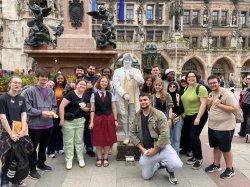Students Study Propaganda and Politics in Berlin and Munich
Posted in: German, World Languages and Cultures

In the last week of May, as some students were heading home or to the beach, seventeen students in Dr. Thomas Herold’s “Nazi Cinema and Propaganda” course (GERM 227) flew to Germany to better understand how the German National Socialist regime mobilized media and politics to fuel authoritarianism and genocide.
In Munich, students visited the concentration camp Dachau and many other historical sites documenting Nazi history, including the memorial and exhibition on the resistance movement Die Weiße Rose. They also took time to complement their visits with classroom discussions and a swim in the Ammersee, a lake near the monastery Andechs to which they had hiked on a beautiful and sunny Sunday, a visit to Salzburg in Austria, and a rather challenging hike in what felt like much more than just the foothills of the Alps. One day was spent in Nürnberg, where students toured the visitor’s center on the site where Hitler held party rallies that were made infamous by Hitler’s filmmaker Leni Riefenstahl. Students also explored the medieval castle and old town, as well as the site of the Nuremberg trials. The final five days were spent in Berlin, where students studied contemporary German memory culture, visiting the Jewish Museum and the Holocaust Memorial, among many other sites.
Co-leading the faculty-led travel course was Zak Zerby ’16 (Linguistics and German), Dr. Herold’s former student, who is now a part-time faculty member in Linguistics. The two were described by one student as a travel “dream team,” balancing the structure of formal learning with the exploration of international travel experience.
“I like to see students’ awareness of the link between media and politics grow throughout the course,” says Dr. Herold, who is also eager to see many of the students build on this faculty-led study abroad experience to study abroad on their own someday in one of Montclair’s summer, semester, or year-long programs. Many students in the course are German minors, or are combining the German major with another major such as Communications, Linguistics, Design, Psychology, or Informational Technology.
“Whatever the student’s major is, I hope they come back from this trip feeling like they have a deeper understanding of European history and life today,” Dr. Herold remarks. His favorite moments were those when the whole group had the chance to return to a classroom (one was provided by the Ludwig-Maximilians-Univerisity Munich and one by the Center for Interreligious Dialog of the Protestant Church in Berlin) and discuss their experiences between fascist aesthetics and propaganda, representations of the Holocaust, and the politics of memory in 21st-century Germany.
These discussions brought to life Montclair’s conviction that study abroad truly is a high-impact learning experience. Says another student, Ath-Yah Brathwaite: “Traveling to Germany with this course allowed me to experience the culture beyond typical tourism. By studying Nazi propaganda and memory culture, I gained a deeper understanding of historical narratives and events, as well as their effects on the past, present, and future.”
This was Dr. Herold’s first faculty-led travel course, and he looks forward to future courses soon. “There is so much left to discover with students,” he comments. In the meantime, students will continue to prepare themselves for global experiences in other hands-on ways both inside and outside the classroom. See more news about the German program’s community engagement and experiential learning projects here.
